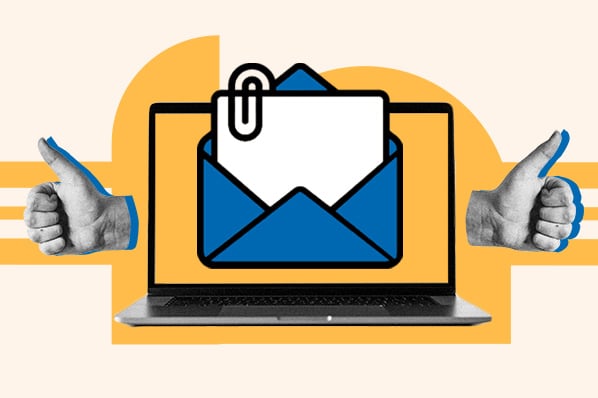Whoever came up with the saying, “Sticks and stones will break my bones, but words can never hurt me,” clearly never emailed prospects. In a sales email, one poorly chosen word or phrase can kill your chances of getting a reply.
To avoid this fate, steer clear of these 19 words and phrases that buyers hate reading.
1) “Get a dialogue going,” “Open the lines of communication”
Reps use these clichéd phrases to feel out whether prospects want to have a conversation. But if they don’t provide an additional reason for reaching out that’s clear, concrete, and useful to the buyer, their email will fall flat: Prospects are too busy to talk to a salesperson “just because.”
Start with a thought-provoking question or offer to help rather than a vague statement like, “I wanted to get a dialogue going.”
Here are a few examples:
- “Here’s a helpful blog post about the new health regulations. Has Cornerbrick started to transition?"
- “I know the Orange Foundation’s director -- would you like an intro?”
2) “Wanted to say hey,” “Wanted to introduce myself”
You’re a stranger, so buyers are unconcerned with what you want. These lines make you sound self-interested and arrogant.
In addition, you’re essentially admitting you don’t have a defined purpose. Outreach emails should revolve around the value you can offer your prospects, not an invitation to talk.
3) “Long time no talk”
Use this phrase when you bump into an old friend, not in your sales emails. Your prospects will typically be turned off by the chummy tone, especially if you didn’t receive the warmest reception from them in previous communications. And since so many salespeople have used this line to pretend they’re restarting a former conversation, prospects may read this and lump you in with reps who rely on sleazy tricks.
4) “Truthfully,” “honestly”
Everything you tell prospects should be truthful -- so why preface a specific sentence with this word?
“When I hear somebody say [honestly], I can’t help but think if what they’ve been telling me up to now has been a lie,” says sales trainer Mark Hunter.
5) “Hey,” “Hello there”
Some prospects will appreciate the casual, friendly vibe of these openers. In fact, we usually suggest making your email conversational. But as Sales Aerobics for Engineers founder and president Babette Ten Haken explains, “‘Hey’ and ‘Hello there’ are easily perceived as disrespectful greetings in many professional contexts.”
Ten Haken never answers emails that begins with these salutations.
“The salesperson’s poor business etiquette negatively impacts my perception of their brand and business acumen,” she says.
The takeaway? Always remember your audience. What works for one prospect will piss off another. Before you email someone, research them on social media to get a feel for their personality and which tone they’ll respond to.
6) “[Competing product]”
The competition might be top-of-mind for you, but that doesn’t mean they’re even on your prospect’s radar. If there’s no elephant in the room, don’t invite one in.
Bringing up your competitors also harms your integrity and makes you seem desperate.
7) “Touching base,” “checking in”
Want to lose your prospect’s attention in two words? Use either of these phrases. “Checking in” emails don’t add any value to your recipients’ lives: Their sole purpose is getting your prospects back on your timeline.
Buyers are concerned with their agenda, not yours -- and rightfully so.
8) “Discount”
Steer clear of this word in your first several emails. There’s a time and place in the sales process for offering discounts: After your prospect has realized your product’s value. Mention a discount earlier, and your email will sound overly pushy.
9) “Amazing,” “fantastic,” “unbelievable,” “brand-new,” “best-in-class,” “cutting-edge,” “disruptive,” “seamless”
Hyperbolic words have no place in your emails. Not only will your prospects cast a skeptical eye on your claims, but you risk sounding like a cheesy infomercial. Let your product speak for itself. Buyers will be far more convinced of its “amazing” value once they’re convinced they need an offering and that your product’s features, benefits, and uses could be a good fit for them.
10) “!”
Technically, an exclamation mark isn’t a word -- but it’s so egregious we’re including it anyway. Using this type of punctuation makes you sound salesy and overly enthusiastic, not to mention distracts your prospect from your actual message. A period is almost always the better choice.
Before: “Your presentation on ALS research was wonderful!”
After: “Your presentation on ALS research was wonderful.”
11) “Urgent”
Don’t tell your prospect it’s an “urgent” matter -- lead them to that conclusion by showing how their business will be affected without your product. They’ll be far more convinced if they make up their mind on their own.
12) “How are you?”
This bland opener won’t just bore your prospects -- it’ll irritate them. If you open an email with this generic phrase, you’re not really asking -- you’re simply checking a box. Buyers will immediately be on-guard for whatever you’re going to ask.
13) “I,” “me”
Your messages shouldn’t be about you: They should be about the product. With that in mind, refer to yourself as infrequently as possible. You can usually restructure “I/me” sentences as “you/your” ones.
Before: “I’ve got a few tips on streamlining your purchasing process.”
After: “Would you be interested in a few tips on streamlining your purchasing process?”
14) “Really,” “extremely,” “very,” “highly”
These qualifiers clog up your sentences. To make your emails more crisp and concise, remove them completely.
15) “Just”
Do you ask prospects for “just” a short call or tell them you’re “just” following up? You’re sabotaging yourself. Saying “just” can make you sound deferential and insecure, as though you’re apologizing for taking up your recipient’s time. If you’re asking for your prospects’ time or for them to complete a task, using “just” also minimizes the time and effort they’ll have to spend.
16) “Things”
The more precise you are, the more persuasive you’ll be. You might know exactly which “things” you’re talking about -- but your prospect will be clueless. Provide clarity by replacing these words with specific nouns or cutting them altogether.
Before: “What kind of things are you struggling with?”
After: “Which challenges are you struggling with?”
Before: “Our clients are using us to do things like optimize client acquisition spend, understand retention rates, and standardize KPI reporting.”
After: “Our clients use our tools to optimize client acquisition spend, understand retention rate, standardize KPI reporting, and more.”
17) “But”
You never want to sound defensive. When your prospects read “but,” they tend to remember the first part of your statement and forget the second. For instance, if you wrote, “Your hotel may not be overbooked now, but it’ll be wedding season soon,” they’d hone in on the part about not being overbooked.
To avoid this issue, get rid of the “but” and everything leading up to it, then add any necessary context. The above sentence would now read:
“It’ll be wedding season soon, which means you may become overbooked.”
18) “Sorry I missed you,” “Sorry we weren’t able to connect”
Unless you want to sound passive-aggressive, don’t use these lines to follow up with a buyer who flaked. Your prospect knows you didn’t actually “miss” them: They simply didn’t show up.
You’ll sound more sincere by matter-of-factly saying what happened and asking to reschedule, like so:
“I called you at 1:30 but didn’t reach you. Are you free tomorrow at the same time?”
19) “Ping,” “circle back,” “loop you in,” “ideate,” “marinate on that,” “optimize,” “utilize,” “leverage”
Buzzwords and jargon are annoying. They have the added effect of making you sound like everyone else -- which doesn’t help your cause when you’re striving to be memorable.
Whenever you find yourself using “office speak,” replace the offending word or phrase with plain English.
Here are translations for some of the most overused words:
- Ping: email, message
- Circle back: update
- Loop you in: involve you
- Ideate: come up with ideas
- Marinate on that: think about that
- Optimize: improve
- Utilize: use
- Leverage: use
Once you’ve deleted these words and phrases, your messages will have more impact. Sticks and stones may break your bones, but words can make or break your response rates.





![How to Introduce Yourself in an Email in [Almost] Every Situation](https://www.hubspot.com/hubfs/how-to-introduce-yourself-over-email-1.jpg)


![23 Sales Email Templates With 60% or Higher Open Rates [+ Bonus Templates]](https://www.hubspot.com/hubfs/sales-email-templates-2.jpg)


